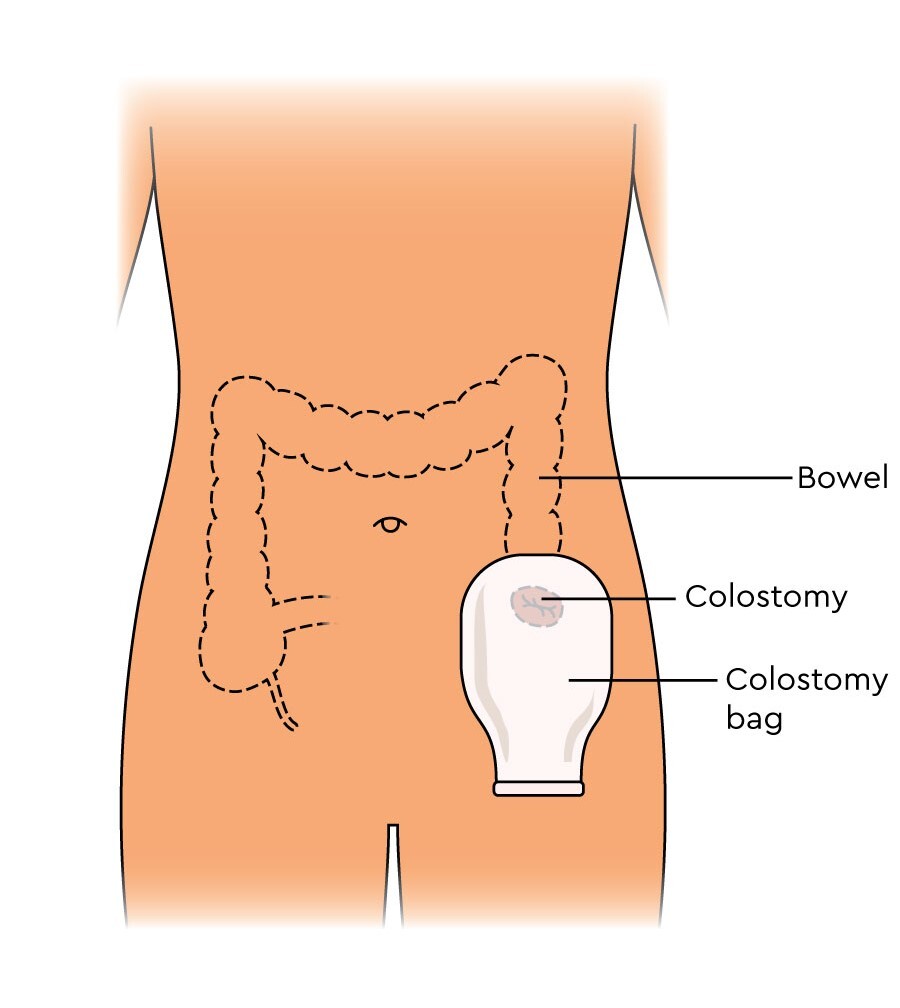When we talk about prostheses, most of us think of prosthetic legs and arms like those we see used by Paralympic athletes. I was interested to learn from Prof Alex Dickinson’s lecture that the definition of a prosthesis is much broader, encompassing any artificial replacement body part.

Stomas and ostomy bags technically come under this definition, but see far less media attention. A stoma is a hole made in the abdomen during surgery, through which to divert faeces (or urine, but I’m not going to cover that here). The surgery is called a colostomy or ileostomy, depending on whether it is part of the large or small intestine that is diverted through the stoma, and the piece of bowel empties into an ostomy bag, which is affixed to the outside of the body.
A stoma may be temporary or permanent, depending on the type of surgery and the reason it is needed. According to the NHS2, a person may need to have part of their bowel removed due to a tumour, infection or inflammatory bowel disease (IBD) such as Crohn’s disease or Ulcerative Colitis. Temporary stomas may be needed to give the bowel the opportunity to rest after surgery, or if there has been an injury to the bowel, and may be reversed later. These interventions can be life-changing for the people undergoing them, who are often living with severe pain, digestive issues and sometimes incontinence prior to surgery. Sometimes stoma surgery is the only option to save a person’s life.
When K, a close friend of mine, first told me about her stoma I had never even heard of the word. I don’t think I was alone in my ignorance. According to Colostomy UK3, one in 335 people in the UK live with a stoma, so why are they so rarely talked about?
Social stigma around our bodily functions (especially the smelly ones!) means that this area of medicine is shrouded in mystery for most ordinary people. Nobody wants to talk about their poo, and discussions of bowel disease are a step too far for many a mild-mannered Brit. I am absolutely in support of keeping bodily fluid talk to a minimum at the dinner table, but what about in wider discussion? These things need to be talked about.
According to Crohn’s & Colitis UK4, people living with IBD can often experience feelings of shame and isolation as a result of their disease. Stomas are widely misunderstood; K tells me that hers has enabled her to regain the freedom to live a normal life, but she still faces social stigma, even from the nurses that she works with. It can be hard dealing with people’s misconceptions at the same time as trying to navigate life with a chronic illness.
Negative conversation about bowel disease and stomas, a reality for so many people, can have a real detrimental effect on their self-esteem. It can also be a barrier to meeting needs in the workplace, such as access to a disabled toilet, or accommodations for symptoms.
A more open discussion is needed around bowel disease, stomas and invisible illnesses, so that people like K can have the confidence and resources to access the support they need to live a healthy and fulfilling life. Crohn’s & Colitis UK’s Are You IN? 5 campaign aims to start the conversation by educating employers and employees about invisible illnesses such as IBD. Everyone can play their part by being mindful about how we talk about these conditions, recognising that what might seem strange to us is another person’s reality.
K consented to the information shared here, and her initial has been changed to protect her privacy.
Sources
- MacMillan Cancer Support (2025). What is a stoma? (accessed 04/03/25). Available at https://www.macmillan.org.uk/cancer-information-and-support/bowel-cancer/what-is-a-stoma ↩︎
- NHS (2024). Health A-Z, Colostomy (accessed 04/03/25). Available at https://www.nhs.uk/conditions/colostomy/ ↩︎
- Colostomy UK (2025). What is a stoma? (accessed 04/03/25). Available at https://www.colostomyuk.org/information/what-is-a-stoma/ ↩︎
- Crohn’s & Colitis UK (2025). Mental health and wellbeing (accessed 04/03/25). Available at https://crohnsandcolitis.org.uk/info-support/information-about-crohns-and-colitis/all-information-about-crohns-and-colitis/living-with-crohns-or-colitis/mental-health-and-wellbeing ↩︎
- Crohn’s & Colitis UK (2025). Are you IN? (accessed 04/03/25). Available at https://crohnsandcolitis.org.uk/our-work/campaigns/are-you-in?_gl=1*1w75irk*_up*MQ..*_ga*Njg1NjMyNDE0LjE3NDA4NDM1NzU.*_ga_5THF1XE73Q*MTc0MDg0MzU3NC4xLjEuMTc0MDg0Mzc2My4wLjAuMA.. ↩︎
This is an excellent reflective and engaging blog. The use of personal experiences is really good. It could be improved with more use of multimedia such as images and videos.